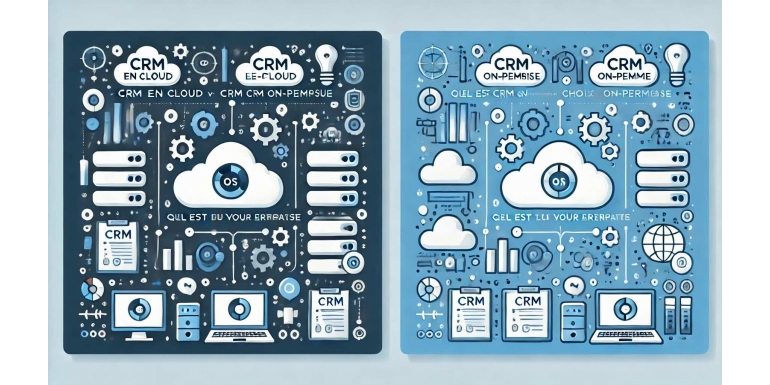
Cloud CRM vs. On-Premise CRM: Which Is the Best Choice for Your Business?
Choosing a customer relationship management (CRM) system is a major strategic decision for any business. There are primarily two options: a cloud-based CRM, also known as SaaS (Software as a Service), and an on-premise CRM, installed locally on the company’s servers. Each of these solutions offers advantages and disadvantages that must be evaluated based on your company’s specific needs. This article compares these two options to help you determine which one is best suited for your organization, with a particular focus on Dolibarr, a flexible open-source CRM that can be deployed in both configurations.
1. Understanding Cloud CRM
Cloud CRM is a solution hosted on remote servers, accessible via the Internet. This type of CRM is typically provided by a service provider who takes care of the infrastructure, updates, and security. Users can access the CRM from any location, as long as they have an Internet connection.
Dolibarr can be configured as a cloud CRM, offering great flexibility for businesses that want to minimize infrastructure costs and benefit from easy and secure access to their data from anywhere. Dolibarr in the cloud allows companies to get started quickly without worrying about complex hardware installations.
Advantages of Cloud CRM:
- Accessibility: Users can access the CRM from any location with an Internet connection, which is ideal for remote teams or companies with multiple locations.
- Automatic Updates: The service provider manages software updates and security patches, reducing the workload of the IT team.
- Scalability: Cloud solutions are easily scalable, allowing capacity adjustments based on the company’s needs.
- Lower Initial Costs: The absence of hardware installation costs makes cloud CRM more affordable in the short term.
Disadvantages of Cloud CRM:
- Internet Dependency: An Internet connection is essential to access data, which can be problematic in the event of network outages.
- Recurring Costs: Monthly or annual subscriptions can add up over time, potentially being less economical in the long run.
- Less Control: Companies have less control over updates and advanced customization compared to an on-premise solution.
2. Understanding On-Premise CRM
On-premise CRM is installed locally on the company’s servers and managed internally. This type of CRM offers total control over data, security, and updates, but it requires larger initial investments in hardware and IT personnel.
Dolibarr can also be installed as an on-premise CRM, allowing companies to maintain full control over their infrastructure and customize the system according to their specific needs. This option is particularly appealing for companies with strict data security requirements or operating in regulated industries.
Advantages of On-Premise CRM:
- Total Control: Companies have complete control over the system, data, and security processes.
- Customization: On-premise solutions generally offer more customization options based on the company’s specific needs.
- Data Security: Local data storage can provide better protection against data breaches, especially for companies in highly regulated industries.
- Long-Term Costs: While the initial investment is high, long-term costs may be lower, especially for large companies.
Disadvantages of On-Premise CRM:
- High Initial Costs: The purchase of hardware, licenses, and hiring of qualified technical staff can represent significant investments.
- Maintenance: The company is responsible for system maintenance, updates, and security, requiring dedicated resources.
- Limited Access: Remote access can be more complex to implement and often requires VPN configurations or other secure access solutions.
3. Dolibarr: A Flexible Solution for Both Approaches
Dolibarr stands out for its flexibility, being capable of operating both as a cloud-based CRM and an on-premise CRM. This flexibility allows businesses to start with a cloud setup to test the solution, and later switch to an on-premise installation if needs evolve. Dolibarr is also modular, allowing companies to add or remove features based on their growth or changing needs.
As an open-source CRM, Dolibarr also offers the advantage of transparency and customization. Companies can access the source code to tailor the system to their specific requirements, which is a significant asset for organizations with unique needs.
4. Which Is the Best Choice for Your Business?
The choice between a cloud CRM and an on-premise CRM depends on several factors, including your company’s specific needs, budget, security requirements, and existing infrastructure.
- If you are a small or medium-sized business with limited resources, a cloud CRM like Dolibarr might be the best option due to its low initial costs, ease of deployment, and scalability.
- If you are a large company with strict security requirements or operating in a regulated industry, an on-premise CRM might be more suitable. Dolibarr offers a robust solution for this type of setup, with full control over data and advanced customization.
Conclusion
Choosing between a cloud CRM and an on-premise CRM is crucial for effectively managing your customer relationships. Each option has its own advantages and disadvantages, and the best choice will depend on your company’s specific needs. Dolibarr presents itself as a flexible CRM solution that can be adapted to either configuration, offering maximum flexibility to meet your business’s changing demands.
By considering key factors such as cost, security, customization, and scalability, you can make an informed decision that will support your company’s long-term growth and success.
